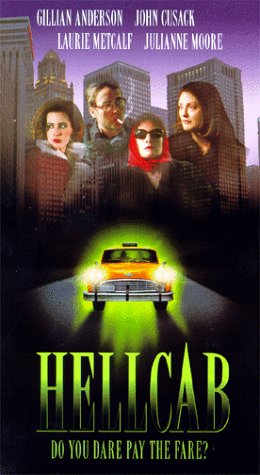|
Hell Cab Film review by Thomas M. Sipos |
|
MENU Books Horror Film Festivals and Awards
Pursuits
Blogs Horror Film Festivals and Awards
Other
|
Hell Cab (1998, dir: Mary Cybulski and John Tintori, scp: Will Kern; cast: Paul Dillon, Gillian Anderson, Laurie Metcalf, Julianne Moore, John Cusak; aka Chicago Cab)
Hell Cab is NOT a horror film. It is an art film. And not a very good art film. This warning is necessary due to Hell Cab's deceptive marketing. Apparently, its distributor (Trimark) decided that Hell Cab couldn't stand on its own merits, so Trimark gussied up the video box to evoke a horror film. Hell Cab's marketing is a LIE. Hell Cab's original title was Chicago Cab, based on a stage play of the same name. That's right, a stage play. You won't know it from the video box. The title Hell Cab glows in eerie green letters. The taxicab on the box also glows green, evoking Stephen King's Christine. Looks like horror. Its logline reads: Do You Dare Pay The Fare? Sound like horror. Now read description on the box: "It's the darkest night of the year -- winter solstice -- 6:00 a.m. and 20 degrees below zero (sic!) when an unsuspecting cab driver picks up his first fare. Unaware of what's to take place, the cabby drops the strange passengers, setting into motion an unstoppable, unalterable, unfathomable series of events. It's as if the cab mysteriously draws the most bizarre and dysfunctional people in the city. Exhausted and afraid, the driver summons all his courage to make it through his shift, but will he survive what's become the longest night of his life?" Well, the fact that it's winter solstice has no bearing on the story. The cabby (Paul Dillon) is not unsuspecting, nothing takes place, there is nothing mysterious about the cab's draw of passengers, who are not especially bizarre, and there is nothing unstoppable, unalterable, or unfathomable about any series of events. Nor is there any reason for the cabby to summon all his courage on what, as the film reveals, is a typical night in the life of someone with a lousy job. Hell Cab's plot structure is very common to sitcoms and stage plays. Choose a locale traversed by a cross section of society (a bus stop, hotel lobby, restaurant, casting agency), then make wry observations as that cross section traverses on through. I can imagine the staging. A few chairs with actors hopping in and out.
The cross section is what you'd expect. The dangerous passenger, the couple having sex in the back seat, the rush to get a pregnant wife to hospital, the black passenger complaining about cabbies who don't pick up blacks, the bickering couple, the rich matron who flirts with the cabby. And more. A great many more. That's because each passenger occupies only a minute or two of screen time. Don't be fooled by the stellar cast. A minute or two doesn't afford much screen time to anyone. Gillian Anderson occupies under two and a half minutes. In another film, her part would be regarded a cameo. But since her screen time is as long as anyone else's (apart from star Dillon's) Anderson shares top billing. And her X-Files renown helps fool viewers into thinking they're renting a horror film. And yes, many video stores carry Hell Cab in the horror section. John C. Reilly (outstanding as the small time gambler in Hard Eight), also has a few minutes in Hell Cab, playing a heel who gleefully tells the cabbie about how he deceives his sweet-natured receptionist/mistress. Apart from its lying marketing, can Hell Cab stand on its own art film merits? Hell Cab has its moments. Strong moments, too. Powerful, poignant, insightful, authentic. But these moments are few, brief, and then on to the next fare. No, Anderson's moment is not one of the good ones. She affects a blue collar Italian accent (not very well), playing a woman bickering with her beau. Her scene is pointless and unresolved. Most scenes are unresolved, as is the film itself. The bulk of Hell Cab is dull and depressing, a series of slice-of-life vignettes that say nothing and go nowhere. One pities the cabby rather than sympathize with him. Nothing is learned, the film ends without change. The point seems to be: here is a man with a lousy life and no future, and look at all the miserable people he meets all day. That's a kind of horror, but not the kind the video box advertises. On its own merits, I'd be tempted to give Hell Cab a pass, for its few standout moments (the rape victim, the architect, and Reilly's deceived receptionist). Indeed, I enjoy indie films, the Sundance Channel, the Independent Film Channel. But I was in a mood for horror when I bought Hell Cab (yup, I paid for it!), so its LYING marketing left me with a sour taste. (Good thing Blockbuster accepts refunds).
If Chicago Cab sounds like an intriguing stage play, you may indeed wish to see Hell Cab. But don't rent it under the mistaken assumption that the cab will glow green and transform into a portal to Hell. (At least, not to Satan's Hell.) Besides, if you're in the mood for an indie film about cabbies, Driven (not to be confused with the 2001 Sly Stallone film of the same name) is better. Released in 1996 (sometimes listed as 1998) Driven is about several cabbies and the dreams they harbor. Driven is both darker and brighter than Hell Cab, in that one of the cabbies is killed, but most of them eventually escape their hellish jobs for more hopeful futures. Driven also features my favorite succubus (actress Diane Dilascio from Poltergeist: The Legacy's "Black Widow" episode) in the role of an emotionally closed woman conflicted over whether to "settle" for a cabbie. Review copyright by Thomas M. Sipos
|
"Communist Vampires" and "CommunistVampires.com" trademarks are currently unregistered, but pending registration upon need for protection against improper use. The idea of marketing these terms as a commodity is a protected idea under the Lanham Act. 15 U.S.C. s 1114(1) (1994) (defining a trademark infringement claim when the plaintiff has a registered mark); 15 U.S.C. s 1125(a) (1994) (defining an action for unfair competition in the context of trademark infringement when the plaintiff holds an unregistered mark).

 This is
more than a review. It is a warning.
This is
more than a review. It is a warning.